
Going My Way is a 1944 American musical comedy drama film directed by Leo McCarey and starring Bing Crosby and Barry Fitzgerald. Written by Frank Butler and Frank Cavett based on a story by McCarey, the film is about a new young priest taking over a parish from an established old veteran. Crosby sings five songs with other songs performed onscreen by Metropolitan Opera's star mezzo-soprano Risë Stevens and the Robert Mitchell Boys Choir. Going My Way was followed the next year by a sequel, The Bells of St. Mary's.

The Bells of St. Mary's (1945) is an American musical comedy-drama film, produced and directed by Leo McCarey and starring Bing Crosby and Ingrid Bergman. Written by Dudley Nichols and based on a story by McCarey, the film is about a priest and a nun who, despite their good-natured rivalry, try to save their school from being shut down. The character Father O'Malley had been previously portrayed by Crosby in the 1944 film Going My Way, for which he won the Academy Award for Best Actor. The film was produced by Leo McCarey's production company, Rainbow Productions.
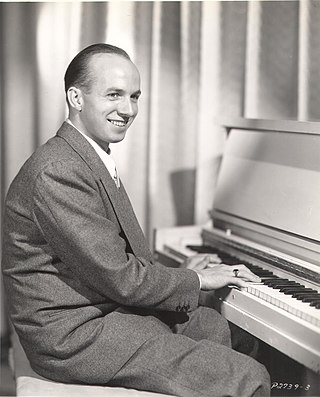
James Van Heusen was an American composer. He wrote songs for films, television and theater, and won an Emmy and four Academy Awards for Best Original Song.

John Francis Burke was an American lyricist, successful and prolific between the 1920s and 1950s. His work is considered part of the Great American Songbook.
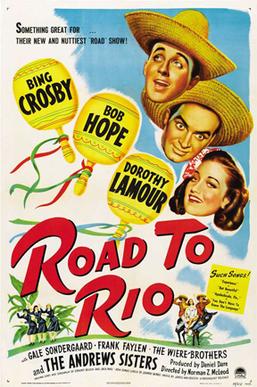
Road to Rio is a 1947 American semimusical comedy film directed by Norman Z. McLeod and starring Bing Crosby, Bob Hope, and Dorothy Lamour. Written by Edmund Beloin and Jack Rose, the film is about two inept vaudevillians who stow away on a Brazilian-bound ocean liner and foil a plot by a sinister hypnotist to marry off her niece to a greedy fortune hunter. Road to Rio was the fifth of the "Road to …" series.
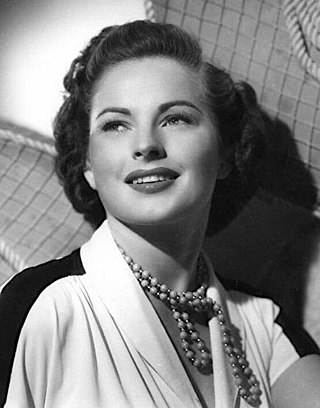
Coleen Gray was an American actress. She was best known for her roles in the films Nightmare Alley (1947), Red River (1948), and Stanley Kubrick's The Killing (1956).
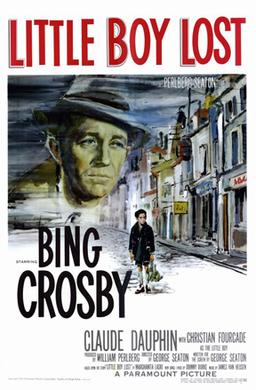
Little Boy Lost is a 1953 American drama film directed by George Seaton and starring Bing Crosby, Claude Dauphin, and Christian Fourcade. Based on the novel Little Boy Lost by Marghanita Laski, the film is about a war correspondent stationed in Paris during World War II and once married to a young Frenchwoman who was murdered by the Nazis. Following the war, he returns to France trying to find his son, whom he lost during a bombing raid but has been told is living in an orphanage in Paris.

Broadway Bill is a 1934 American comedy-drama film directed by Frank Capra and starring Warner Baxter and Myrna Loy. Screenplay by Robert Riskin and based on the short story "Strictly Confidential" by Mark Hellinger, the film is about a man's love for his thoroughbred race horse and the woman who helps him achieve his dreams. Capra disliked the final product, and in an effort to make it more to his liking, he remade the film in 1950 as Riding High. In later years, the distributor of Riding High, Paramount Pictures, acquired the rights to Broadway Bill. The film was released in the United Kingdom as Strictly Confidential.
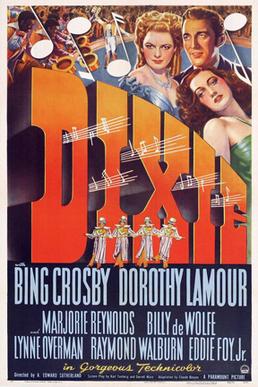
Dixie is a 1943 American biographical film of songwriter Daniel Decatur Emmett directed by A. Edward Sutherland and starring Bing Crosby and Dorothy Lamour. Filming in Technicolor, Dixie was only a moderate success and received mixed reviews. Contrary to rumor, it has not been withdrawn from circulation due to racial issues but is simply one of hundreds of vintage Paramount Pictures from the 1930s and 1940s now owned by Universal and not actively marketed; it was broadcast several times in the late 1980s on the American Movie Classics channel. The film produced one of Crosby's most popular songs, "Sunday, Monday, or Always".

Carnival in Flanders is a musical with a book by Preston Sturges, lyrics by Johnny Burke, and music by Jimmy Van Heusen.
"Like Someone in Love" is a popular song composed in 1944 by Jimmy Van Heusen, with lyrics by Johnny Burke. It was written for the 1944 film, Belle of the Yukon, where it was sung by Dinah Shore. It was a hit for Bing Crosby in March 1945, reaching number 15 in the charts, and has since become a jazz standard. In 1993, on Björk’s album Debut, a cover of this song was used as the fifth track.

Top o' the Morning is a 1949 American romantic comedy film directed by David Miller and starring Bing Crosby, Ann Blyth, and Barry Fitzgerald. Written by Edmund Beloin and Richard L. Breen, the film is about a singing insurance investigator who comes to Ireland to recover the stolen Blarney Stone—and romance the local policeman's daughter.
"Personality" is a popular song with lyrics by Johnny Burke and music by Jimmy Van Heusen. It was written for the 1946 film Road to Utopia, and Dorothy Lamour performed it in the movie. Van Heusen said that he wrote the song with a limited vocal range to accommodate Lamour.

Welcome Stranger is a 1947 film directed by Elliott Nugent and starring Bing Crosby, Barry Fitzgerald, and Joan Caulfield. It was filmed in Hollywood with location shots at Munz Lakes during March to May 1946. Elliott Nugent appeared in one scene as a doctor sent to examine Barry Fitzgerald and that scene was directed by Billy Wilder.

Mr. Music is a 1950 film starring Bing Crosby and Nancy Olson, directed by Richard Haydn, and released by Paramount Pictures. It is based on the play Accent on Youth written by Samson Raphaelson. Filming took place from October to December 1949 in Hollywood.
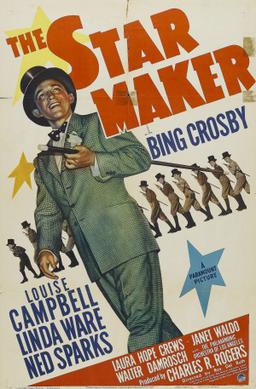
The Star Maker is a 1939 American musical film directed by Roy Del Ruth, written by Frank Butler, Don Hartman and Arthur Caesar, and starring Bing Crosby, Louise Campbell, Linda Ware, Ned Sparks, Laura Hope Crews, Janet Waldo and Walter Damrosch. Filming started in Hollywood on April 17, 1939 and was finished in June. The film was released on August 25, 1939, by Paramount Pictures, and had its New York premiere on August 30, 1939. It was the only film in which Crosby played a happily married man.
"(We're Off on the) Road to Morocco" is a song composed in 1942 by Jimmy Van Heusen, with lyrics by Johnny Burke, for the film Road to Morocco, in which it was performed by Bing Crosby and Bob Hope. Crosby recorded a solo version of the song, with different lyrics, on June 10, 1942, with Vic Schoen and his orchestra. Subsequently, on December 8, 1944, Crosby and Hope recorded a duet version which reached the No. 21 position in the Billboard charts briefly in July 1945.

Selections from Road to Utopia is a studio album of phonograph records by Bing Crosby released in 1946 featuring songs that were presented in the American musical comedy film Road to Utopia. However, the song "Road to Morocco" came from the film of the same name and was not actually used in Road to Utopia. Another song - "Goodtime Charlie" - was sung by Crosby and Bob Hope in the film but was not commercially recorded. The songs "Would You?" and "Personality" were sung by Dorothy Lamour in the film, not Crosby.
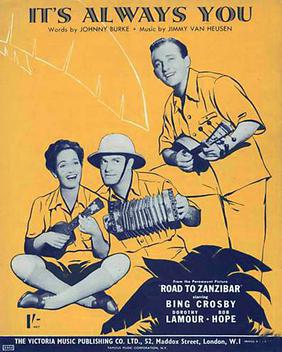
"It's Always You" is a song written by Jimmy Van Heusen (music) and Johnny Burke (lyrics) for the 1941 film Road to Zanzibar. In the film it was sung by Bing Crosby to Dorothy Lamour as they paddled a canoe up a jungle river. It was also used briefly in a comedy scene in the film as a quasi-requiem for Lamour's character, who was erroneously thought to have been killed by a leopard.

Songs from Mr. Music is a Decca Records studio 78rpm album of phonograph records by Bing Crosby, The Andrews Sisters and Dorothy Kirsten of songs from the film Mr. Music.

















